If you want to dial in a killer blues tone, you need to make sure you have the right guitar for the job. And whilst in most music shops, there is not a specific category of ‘blues guitars’ – there are instruments that are much better suited for the blues than others.
So if you are just starting out playing the guitar and you are not sure of which guitar you should buy, or if you are getting into the blues and want to change your existing rig, then in this article I will cover the main pieces of information you need to find the right guitar to help you dial in a range of beautiful blues tones.
Buying a new guitar can quickly become very complicated. There are a huge range of different factors to consider. The wood from which it is made, the type of pickups in the guitar, the shape and size of the neck, and the design and features of the bridge are just some of the many different elements that you could consider.
I will touch on some of these elements here. However I will be looking at each of these points more broadly. The aim of this article is to give you all of the information you need to make the right buying decisions. And I hope to do this without bombarding you with every single last detail you might need to take into account.
So with that in mind, let’s get into it. Here is everything you need to know about the best guitars for the blues:
Setting your budget
Before we dive into the details and look at specific guitars that will work well for the blues, I think it is first worth talking through budget. After all, if you are looking to buy a new guitar, you probably have a rough figure in mind that you would be happy or willing to spend. And if you are lucky, then this figure aligns with the figure that your spouse or significant other has in mind too…
There is a huge variation in the price of guitars. You can buy starter guitars for little more than $140/£100. Conversely, you can buy Custom Shop guitars with prices that sometimes exceed $14,000/£10,000.
The budget you have in mind will depend on a number of different factors. And it is perhaps likely that you will be less flexible on price than on some of the other elements listed here.
However before you rigidly set your mind on a particular price, there are a couple of points I think are worth keeping in mind, depending on the rough price bracket you have in mind. These are as follows:
Budget friendly blues guitars
If you are looking to keep costs down, I would not recommend opting for the cheapest guitar you can find. Although you can actually get surprisingly decent guitars for low prices, the very cheapest guitars out there will not play as well, nor last as long as those in a slightly higher price bracket.
I will add in some practical examples of this below. But the difference in quality between a $415/£250 guitar and a $140/£100 guitar is profound. The $415/£250 guitar will be one that you can play for many years. Conversely, the cheaper guitar will just not last so well. And even if it did, there is a likelihood that you will outgrow the guitar fairly quickly.
As such, I would generally recommend spending a little bit more, rather than looking for the cheapest option available. If you are on a tight budget, this might mean you have to save up for a little longer before you buy your new guitar. But it will be the better choice – both practically and financially – in the longer run.
Custom Shop guitars
At the opposite end of the spectrum, it is worth recognising that the difference in quality between a guitar that costs $5000/£3600 and $10,000/£7200 is not always that obvious. Beyond a certain price point, extra cost results in diminishing returns. So if you are looking for a high quality instrument, don’t feel compelled to hunt out the most expensive guitar you can find.
I say this partly because the extra costs are often related to the guitars being modelled closely on those of certain players or on the guitars manufactured in a particularly significant year. So if you are looking at Custom Shop guitars, I would always recommend scrutinising whether you need (or want) the various different elements that result in the higher price.
If you are just starting out, then this might be challenging. As such, if you are new to the guitar I would hold off buying a Custom Shop for now.
In this way, you can learn what kind of tone you are looking for, what style of blues you most enjoy playing, and exactly what features and functionality you want in a guitar.
Playing the waiting game
Regardless of the price bracket you have in mind, if you are unsure of the type of guitar you should buy – and money is influencing your decision – then I would always recommend waiting. Don’t rush out to buy a guitar that you don’t really want, for the sake of having it now.
Instead, wait a few more weeks or months until you can afford the guitar you really want. Not only will you be much happier when you do buy it – you will also be much less likely to suffer from any kind of buyer’s remorse.
I went through this process when I bought my American Elite Fender Stratocaster 5 years ago. I started a new job a number of months before buying it, and saved as much money as I possibly could.
This made the process of buying the guitar so much more enjoyable. I didn’t have to worry about my budget. I had already set aside enough to cover a guitar more expensive than the one that I ended up buying. In fact, I actually played some Custom Shop guitars, and was considering buying one. In the end though opted for an American made Strat, as that was the guitar that I most enjoyed playing.
As a result, I felt (and continue to feel) very happy with my guitar. It wasn’t my budget that forced me to buy a cheaper guitar. It was because I actually preferred playing it compared to the more expensive guitars in the shop.
The last thing you want to do is torture yourself by going to a guitar shop and falling in love with a beautiful guitar that is beyond your budget. If you then go and buy a cheaper guitar, you are much more likely to feel dissatisfied or short changed with that guitar.
Instead, take a little bit longer getting your funds together. Then go out and buy a guitar that will truly bring you joy to play.
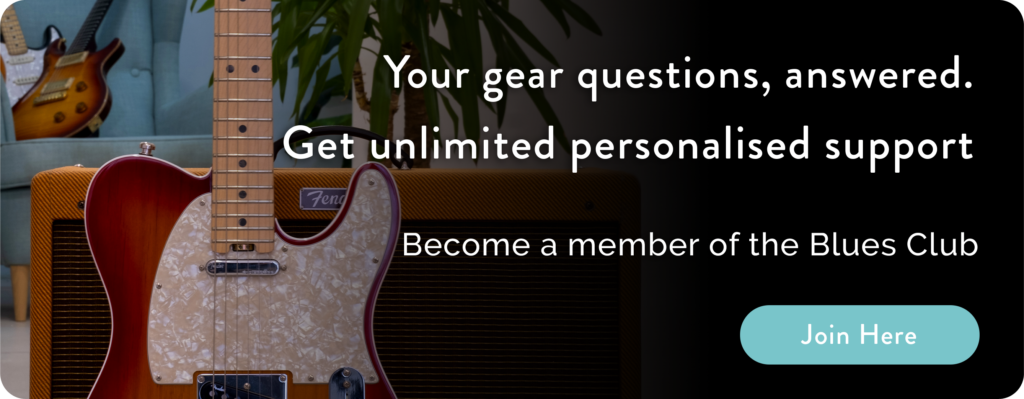
The best brands for the blues
Now we have got those initial caveats out of the way, we can look at some specific brands of guitars that are well suited to the blues.
If you have spent time looking at possible guitars that will work well for the blues – you will have most likely encountered the brands Fender and Gibson. These are two of the oldest and most established guitar manufacturers.
Their instruments have been used by many of the best guitarists of all time. And the majority of famous blues guitarists – both past and present – use (and continue to use) guitars from either Fender or Gibson.
Both of these brands produce guitars in the middle and upper price brackets. This is particularly true of Gibson guitars – the prices of which typically start around $1400/£1000.
However, both Fender and Gibson own companies that offer cheaper alternatives to their more expensive models. Fender offer the ‘Squier’ range of guitars. Likewise, the company Epiphone offers a range of Gibson style guitars in a lower price range.
I will look at each of these in more detail below. However before we look at guitars in different price brackets, I think it is important to look at the main guitars that both Fender and Gibson offer which are well suited to the blues. Let’s start first with Fender:
Fender Stratocaster
The Fender Stratocaster (Fender Strat for short) is unquestionably one of the most iconic guitars of all time. It was first released in 1954 and has since been used by famous guitarists playing in a range of different genres.

In blues and blues rock, it has been used to great effect by innumerable guitarists, just some of which include:
- Jimi Hendrix
- Stevie Ray Vaughan
- Jeff Beck
- Eric Clapton (in his later years)
- Rory Gallagher
- Eric Johnson
- John Mayer
The Stratocaster has remained one of the most popular guitars ever made. And this is for a number of reasons. Firstly, it has a comfortable design and build. Its slim neck and contoured body make it very easy to play, which is one of the key factors you should be considering when looking for a new guitar.
As I noted in more detail in this article here – the Fender Stratocaster is fitted with 3 single coil pickups. These help to give the guitar a bright, articulate and ‘twangy’ sound. The Fender Strat produces beautiful clean tones that ring out with real clarity. It is a dynamic and articulate guitar, which makes it well suited for the blues.
Having said that, part of the success of the Fender Strat is its versatility. It was originally used by guitarists like Buddy Holly and Hank Marvin to produce their crisp and clean guitar tones. But guitarists like Jimi Hendrix and Rory Gallagher – and more recently Philip Sayce and Dan Patlansky have used the Fender Strat to dial in much heavier guitar tones.
Should you buy a Fender Strat?
Although it is very versatile, the Fender Strat does have a characteristic sound and feel. It is always a little difficult to describe the tonal characteristics of a guitar in words. And it becomes more difficult to assess the way a guitar sounds when you consider that guitarists pair their guitars up with different amps, and often a variety of different guitar pedals.
Broadly speaking the Strat is a bright and quite snappy sounding guitar. It produces a clean and crisp tone with a lot of clarity. Guitarists like Robert Cray, Mark Knopfler and Kirk Fletcher have all used a Strat to produce a clean guitar tones, that allow the ‘typical’ sound of a Strat to be heard. Having said that, many of the most famous Strat players have used the guitar as a blank canvas. They then add pedals into the mix to alter their sound.
As such I would recommend looking to your favourite players for inspiration. And here you don’t have to overcomplicate matters too much. Do you love the guitar tones of players like Jimi Hendrix, Jeff Beck and Stevie Ray Vaughan? If so, then a Fender Strat could make a great addition to your rig.
Which Strat is right for you?
If you have decided that you’d like to go for a Fender Strat or Strat style guitar, there are a variety of different options, depending on your budget.
In the lower price range, I would recommend looking at the Fender Squier range. If you are looking for something in the middle range, then Fender produce some great Mexican made guitars. Finally, if you are looking to spend a little more, then either an American made Fender Strat or a Custom Shop Strat would work well.
Here are a number of different Squier and Fender Strats that I would recommend, starting with the lowest priced first:
All of the guitars listed here are similar to one another. So whilst there are differences in the build quality of these guitars, and the components used within them – they all follow the same basic design. As such, any of them will be appropriate for helping you to dial in a range of killer blues tones.
In the lower price range the Squier Classic Vibe guitars are brilliant and offer a lot of value for money. At the other end of the spectrum, the Fender American Original ’50s Stratocaster or a Custom Shop ’59 style Strat would be my top choice.
Fender Telecaster
The Fender Telecaster (Fender Tele) was the first guitar produced by Fender that achieved widespread popularity. Released in 1951, it has since gone on to be one of the most popular guitars that Fender has ever made.

Unlike the Fender Strat, the Fender Tele is less popular amongst blues and blues rock guitarists. In fact it is more commonly used amongst guitarists in the country, country rock and indie genres. Part of this is because the tone the Tele produces can be quite sharp and biting. It produces a ‘twangy’ type of tone, that works well in these types of music.
Having said that, the Fender Tele has still been used by a number of notable blues guitarists, including:
- Muddy Waters
- Albert Collins (The ‘Master Of The Telecaster’)
- Roy Buchanan
- Rory Gallagher (when he played slide guitar)
- Keith Richards
- Robben Ford
- Joanne Shaw Taylor
As you can see from the above list, for the most part these guitarists have used the Tele to dial in sharper and slightly more biting tones.
Having said that – like the Fender Strat – the Tele is also very versatile. Just listen to the instrumental song ‘Freedom‘ by Robben Ford to see the broad range of tones you can create with a Tele.
Should you buy a Fender Tele?
In my opinion, a Tele or Tele style guitar makes a great choice if you are looking for a sharper and more biting guitar tone.
That is not to say you can’t also create a warm tone with a Tele. Rather it is to say that the ‘default’ sound of a Tele is a bit more treble intensive. As such, I would generally recommend a Tele if you want that sharper sound, or if you are trying to recreate the tone of one of the players listed above.
I speak from personal experience here. I actually bought a Tele some years before buying my Strat. It was a brilliant guitar, but I struggled to keep its biting top end under control. I personally favour a warmer guitar tone. And it is for this reason that I have since ended up opting for a Fender Strat over a Fender Tele. So if you are also looking for a warmer and darker tone, then one of the other guitars listed here might make a better choice.
However if you are looking to add a bit of twang to your tone and you want a guitar that is well suited in a range of genres, then a Fender Tele could make a great addition to your rig.
Which Tele is right for you?
If you have decided that you’d like to go for a Fender Tele or Tele style guitar, there are a variety of different options, depending on your budget.
In the lower price range, I would recommend looking at the Fender Squier range. If you are looking for something in the middle range, then Fender offer some great Mexican made guitars. Finally, if you are looking to spend a little more, then either an American made Fender Tele or a Custom Shop Tele would work well.
Here are a number of different Fender Teles that I would recommend, starting with the lowest priced first:
As above, any of the Teles listed here will help you to dial in a range of killer blues tones. Having said that, for more vintage style blues tones, I would always recommend opting for guitars based on those manufactured in the ’50s and ’60s. These will have more vintage appointments compared with some of the more modern Fender guitars. And these are helpful when you are trying to create those nuanced blues tones.
Gibson Les Paul
Along with the Fender Stratocaster, the Gibson Les Paul is one of the most instantly recognisable guitars ever produced. It was first manufactured in 1952 and has since been used by musicians across a range of different genres.
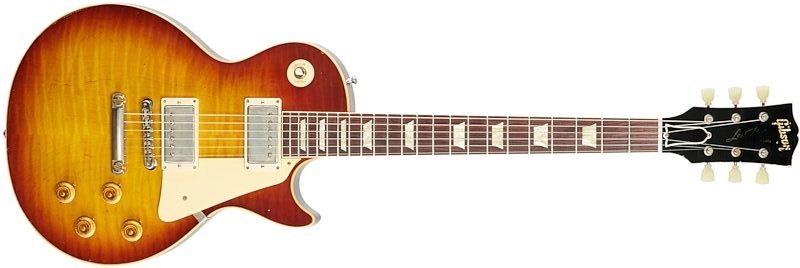
The Gibson Les Paul is a more powerful guitar than either the Fender Stratocaster or Telecaster. This is because it is fitted with humbucker, rather than single coil pickups. Humbucker pickups have a much greater output than single coil pickups. As such, guitars that are fitted with humbucker pickups are generally associated with heavier and more overdriven guitar tones.
Compared with single coil pickups, humbuckers have a ‘warmer’ and ‘fatter’ tone. They aren’t quite as articulate as single coil pickups, and they don’t produce the same bright and twangy tone.
This makes them popular with guitarists who want a heavier and more overdriven tone. However the same tonal characteristics also make them popular with players who want a clean tone, but want it to be smooth and warm sounding, rather than bright and twangy. For this reason, jazz guitarists often play using humbucker pickups.
This power and warmth has made the Gibson Les Paul a very popular choice amongst blues and blues rock guitarists. Just some of the notable guitarists who have used and continue to use a Gibson Les Paul for their killer blues tones are as follows:
- Peter Green
- Gary Moore
- Paul Kossoff
- Joe Bonamassa
- Billy Gibbons
- Slash
- Jimmy Page
- Eric Clapton (in his early career)
As you can see from this list, the Gibson Les Paul has been used to great effect by guitarists looking to dial in heavy blues and blues rock tones.
Should you buy a Gibson Les Paul?
If you are looking to recreate similarly heavy tones, then a Gibson Les Paul could be the best option for you. Like the Fender Stratocaster, the Gibson Les Paul is a very versatile guitar. However its characteristic sound is quite different to the Strat. It is darker and warmer. Additionally, with a Les Paul you can more easily push the guitar into overdriven, heavy tones. As such, it is a brilliant all round blues and blues rock guitar.
The one drawback of the Les Paul is its size and weight. Les Pauls are typically heavy guitars, and they usually have necks that are deep and wide. So if you have smaller hands, or if you prefer to play a guitar that is smaller and lighter, then you might struggle with a Les Paul.
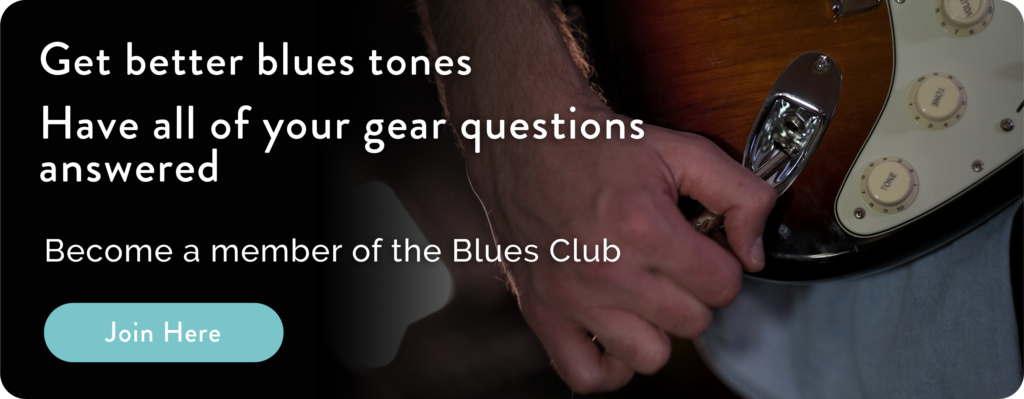
Which Les Paul is right for you?
If you have decided on a Les Paul, then there are some great options across a variety of different budgets.
In the lower price range, I would recommend going for an Epiphone Les Paul replica. If you are looking for something in the middle range, then one of the cheaper Gibson Tribute or Studio models would work well. Finally, if you are looking to spend a little more, then either an American made Gibson or a Custom Shop Gibson would work well.
Here are a number of different Gibson and Epiphone Les Pauls that I would recommend, starting with the lowest priced first:
Broadly speaking, the guitars manufactured by both Epiphone and Gibson are more expensive than those made by Fender. Additionally, there is greater price crossover between Epiphone and Gibson. The most expensive Epiphone guitars are not hugely different in price from the cheapest Gibson guitars.
Guitarists often debate which is the better choice. So if you are in that budget range and you are unsure, I would just recommend trying them out for yourself. In this way you will be able to see which type of guitar your prefer, and make a properly informed decision.
Gibson SG
When it was first introduced, the Gibson Les Paul struggled to make an impact on the guitar market. It sold in very limited numbers, and was swept aside by the variety of guitars that Fender had released. As such, in 1961, Gibson introduced an updated design. They halted production of the standard Les Paul, and introduced the Gibson Les Paul SG. This is the guitar we now know as the Gibson SG.
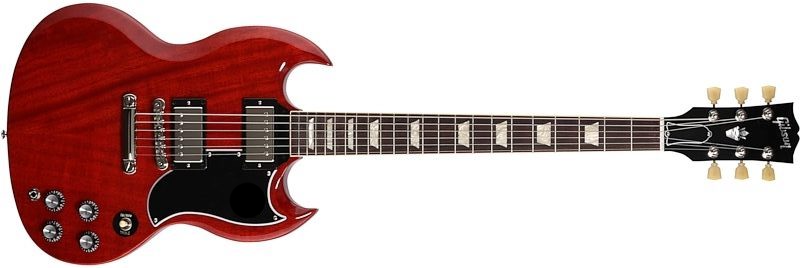
Like the Gibson Les Paul, the Gibson SG is also equipped with humbucker pickups. It is a powerful guitar that has been played by a variety of rock and heavy metal musicians. Angus Young of AC/DC and Tony Iommi of Black Sabbath are two of the most notable.
That is not to say however that the SG is not suitable for softer and more subtle blues tones. Just some of the famous blues and blues rock guitarists who use and continue to use the Gibson SG are as follows:
- Derek Trucks
- Sister Rosetta Tharpe
- Duane Allman
- Samantha Fish
- Eric Clapton (when he played with Cream)
- Gary Clark Jr.
The biggest difference between the Gibson Les Paul and the SG, is that the latter is much thinner and lighter. It also has greater access to the upper frets. It is partly for this reason that it has been and continues to be so popular amongst slide guitarists like Duane Allman and Derek Trucks.
Should you buy a Gibson SG?
You don’t have to play slide guitar in order to play an SG. In fact, like the Gibson Les Paul, the Gibson SG represents a brilliant ‘all round’ guitar that will work well for the blues, as well as a variety of other genres. Significantly, it is also much lighter than the Les Paul. So if you are looking for comfort and playability, then this could perhaps make it more appealing.
Having said that, in my opinion, the Gibson SG doesn’t have the same universality as the Les Paul. I don’t think this is particularly related to its tone. Rather it is related to the fact that visually, the Gibson SG is more widely associated with rock and heavy metal music.
Depending on the type of music you want to play in addition to the blues, this might not be an issue. If you want to play blues and rock music, an SG could be a great choice. However it is worth noting that the SG does look like a guitar made for rock and heavier types of music, rather than softer forms of blues or jazz etc.
Which SG is right for you?
If you want to opt for an SG, then there are some great options across a variety of different budgets.
In the lower price range, I would recommend going for an Epiphone SG replica. If you are looking for something in the middle range, then one of the cheaper Gibson Tribute models would work well. Finally, if you are looking to spend a little more, then either an American made Gibson or a Custom Shop Gibson would work well.
Here are a number of different Gibson and Epiphone SGs that I would recommend, starting with the lowest priced first:
Compared to many of the other Gibson guitars listed here, the Gibson SG is in a lower price bracket. So if you are looking for a vintage humbucker tone, and you are slightly more price conscious, a Gibson SG could be a great choice.
Semi-hollow & hollow body guitars
All of the guitars that I have covered so far have been solid body guitars. Yet some of the best blues guitars out there are in fact ‘semi-hollow body’ or even hollow body guitars.
In a semi-hollow body guitar there is a central section of wood that runs through the middle of the guitar. However on either side of this central block, the wood in the guitar has been hollowed out. In a hollow body guitar, there is no central block of wood and the inside of the guitar is totally hollow. These are less common in a blues context, but there are some notable exceptions, which I have detailed below. Both types of guitars often have characteristic ‘F’ shaped holes on either side of the body. This is to allow airflow through the instrument.
Semi-hollow body guitars share many tonal similarities with solid body guitars. However they tend to be a little warmer and darker sounding. This is one of the reasons why they are popular amongst both blues and jazz guitarists.
Hollow body guitars sound even darker and as you might expect, share some similarities with acoustic guitars. They are much louder and resonate for longer when you play them without an amplifier. When amplified, they have a more pronounced bottom end and a warm and dark sound.
Some of the most notable semi-hollow and hollow body guitars have been manufactured by Gibson and Epiphone. They are as follows:
Gibson
Over the years, Gibson have produced a number of different semi-hollow body guitars. Of these, the most famous is the Gibson ES-335. B.B. King played an ES-335 (which he affectionately named ‘Lucille’) for his entire career. And the guitar has been popular with a whole variety of further blues guitarists. This includes ‘Mr. 335’ Larry Carlton, Alvin Lee, Robben Ford, Eric Clapton and Eric Johnson.
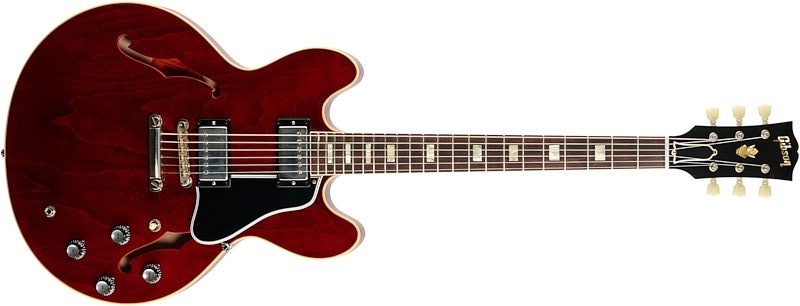
There are a further variety of Gibson semi-hollow body guitars, which are similar in shape and design to the ES-335. These include the ES-345 (famously played by Freddie King), the ES-339 and the ES-355.
To cover the differences between these guitars is beyond the scope of this article. However in broad terms, the key characteristics and differences are as follows:
- The ES-335 is considered to be the ‘flagship’ guitar in the ES range. It is the most famous ES guitar that Gibson have produced
- Of the models listed above, the ES-355 is most similar to the ES-335. Tonally the guitars are almost identical. You can think of the ES-355 as an ES-335 with more luxury appointments
- The ES-339 is also based closely on the ES-335 but it has a smaller body. A lot of players favour the guitar for this reason, as the ES-335 has a very large body
- The ES-345 is similar to the ES-335 but it originally had a ‘Varitone circuit’. This varitone circuit (which you can read more about here) is fairly polarising amongst guitarists, and for this reason the ES-345 is not as popular as many of the other ES models.
If you are looking for a semi-hollow body guitar, then any of these would make a brilliant choice. Which one will work best will be somewhat determined by your budget. As such, I have included ES style guitars across a range of budgets below. However it will also depend on whether you favour a guitar with a smaller body.
Epiphone
Like Gibson, Epiphone also offer a variety of semi-hollow body guitars that are perfect for the blues. Some of these are more affordable versions of the Gibson guitars listed above. And I have listed these below in more detail. However some of the Epiphone semi-hollow body guitars are famous in their own right.
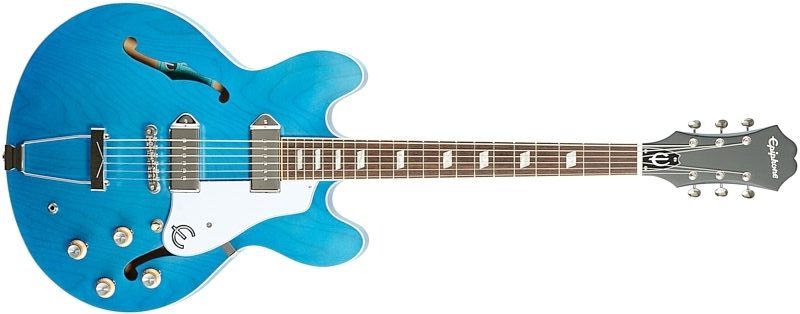
Of these, the Epiphone Casino is perhaps the most notable. Gary Clark Jr. has long used a Casino to craft his heavy blues tones. And long before Clark Jr played a Casino, the guitar was popular amongst players like Howlin’ Wolf, Keith Richards, John Lennon and George Harrison.
Unlike the Gibson guitars listed above, the Casino is totally hollow. This gives it some of the tonal characteristics of an acoustic guitar that I have listed above. Though as you can see, it is also a versatile guitar that you can use to dial in much heavier blues and rock tones.
The Casino is arguably Epiphone’s most famous hollow body guitar. Though having said that, the Riviera is also notable within a blues context, having been used by guitarists like Robben Ford and Otis Rush.
Should you buy a semi-hollow or hollow body guitar?
Eric Clapton once described the ES-335 as being a guitar that was ‘acceptable on every front’. And there is much truth in that statement. In the past 60 years, semi-hollow body guitars have been used by players to dial in guitar tones on opposite ends of the spectrum. B.B. King used the ES-335 to produce his soft and warm blues tones. Conversely, Eric Clapton used the same guitar during Cream’s ‘Farewell Concert’ to produce a heavily overdriven blues rock tone.
As such, if you are looking for a well rounded and versatile blues guitar, a semi-hollow body guitar – whether it is the ES-335 or a similar model – would make a great choice.
Depending on the type of blues you want to play, a full hollow body guitar could also work well. As you can see from some of the players who have used guitars like the Epiphone Casino and Riviera, they are versatile instruments. Having said that, of the two types of guitar I would be more inclined to recommend a semi-hollow body.
In the same way that the default tone of a Fender Telecaster is quite sharp and biting, the characteristic tone of hollow body guitars can be quite dark. Full hollow body guitars can also create a lot of feedback when you play them at higher volumes. So unless you are looking for tones on the jazzier side of the blues guitar spectrum, I would recommend going for a semi-hollow body,
Which semi-hollow body or hollow body guitar is right for you?
If you have decided that you want a semi-hollow or hollow body guitar, then the great news is that there are a range of brilliant options out there, across a variety of price ranges.
In the lower price range, I would recommend looking at the Epiphone versions of the Gibson ES range. In the middle price range – and provided you are looking for a fully hollow body guitar – then one of the Epiphone guitars could work very well. Finally. if you are looking to spend a little more, then either an American made Gibson or Epiphone, or a Custom Shop guitar could work well. Here are a number of different semi-hollow and full hollow body guitars that I would recommend, starting with the lowest priced first:
I imagine that the specific guitar you choose will be determined by a range of factors. However it is worth taking the size of these different guitars into account. For example, the Gibson ES-335 is a large guitar. And so if you have a smaller frame (or you just don’t want to play or handle a large guitar) then you might find it uncomfortable to play. If that is the case, then a slightly smaller guitar like the ES-349 might be more suitable.
Other notable blues guitars
The guitars listed above are just a small cross section of the available options out there. And if you have done much research into different blues guitars, then you may have realised that there are a huge variety of different guitar brands and models out there. Many of these brands will offer guitars that are based on the various designs above. There are innumerable different Strat, Tele and Les Paul style guitars out there. And many of these will help you to dial in killer blues tones.
To list all of these here would be both impractical and also not particularly helpful. So if whilst shopping around you stumble across a Strat or Tele style guitar that is not manufactured by one of the brands listed above, use the information I have provided here, along with reviews, the price, and some research into the company to ascertain whether it will make a good choice.
In addition to the various different brands that offer guitars in the style of those listed above, there are a couple of additional guitars and brands worth mentioning. These are as follows:
The Gibson Flying V
Compared with the other guitars listed above, the Gibson Flying V is not so common. This is true in both the blues and also in other genres. However it is a striking guitar that has been used to brilliant effect by a variety of blues and rock guitarists. Of these, I would argue that Albert King is the most notable. However it was also the guitar of choice for Mountain’s Leslie West, and it has since been used by guitarists like Lenny Kravitz and Joe Bonamassa.
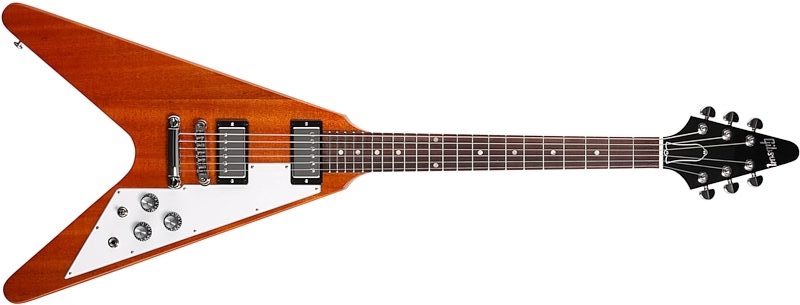
Tonally, Flying Vs are not that dissimilar to other Gibson solid body guitars. They do sound slightly brighter and sharper, because they have higher output pickups. But really, the main considerations you need to make are visual and practical. I have noted these below. However first, here are some of the different Flying V guitars that could work well for you, starting with the lowest priced first:
From a practical perspective – Flying Vs are light guitars, especially when compared with Les Pauls. They also have great access to the upper frets. So if you like to play in the higher registers, or if you are gigging and playing long sets – then a Flying V could be a brilliant choice.
Conversely, playing a Flying V whilst sitting down takes a bit of getting used to. And because of the Flying V’s small body, big neck and unusual design, it does have a very different feel to it. As such, if you are just getting started on the guitar, the Flying V would probably not be my first choice. But before discounting it, try one out. You might find that you love its design and feel!
PRS guitars
In more recent years, Paul Reed Smith Guitars (PRS guitars) have become increasingly popular amongst blues guitarists.
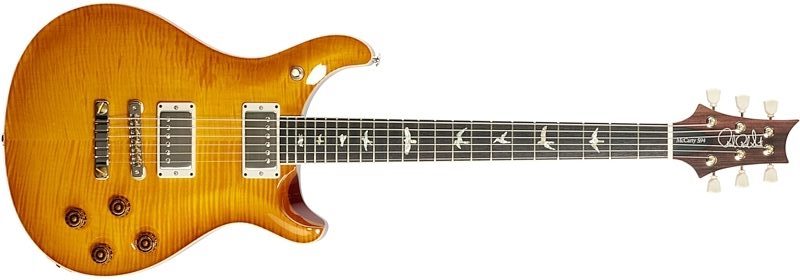
Carlos Santana has long been a proponent of the brand. And at the time of writing, Robben Ford, Joe Walsh and John Mayer are all working with PRS guitars.
Typically, PRS guitars come in at a higher price bracket. So if you are budget conscious they might not have that many viable options. However if you are looking to spend a little more and want a guitar that is slightly different to one of those listed above, then a PRS could make a great choice.
The PRS Silver Sky would be the obvious choice if you are looking for a Strat style guitar. It is John Mayer’s signature guitar and has a range of similarities to the Fender Strat – both visually and tonally.
If you want a semi-hollow body style guitar, then PRS have some great options. And whilst many of these are in the Custom Shop price range, there are some cheaper models too.
Lastly, PRS offer the McCarty range of guitars. Ted McCarty was the President of Gibson guitars between 1950 and 1966 – the ‘golden age’ for the brand. McCarty mentored Paul Reed Smith when Smith first launched his company. Smith later produced the McCarty line of guitars as a tribute to McCarty. As such, the McCarty line of guitars aims to provide a modern twist on vintage style guitars.
Here are some PRS guitars that I would recommend if you want a killer blues tone, but you don’t want to opt for one of the more traditional options listed above:
As is true of the various Custom Shop guitars listed earlier in this article, I wouldn’t recommend rushing out to buy a PRS if you are new to the guitar or the blues This is partly because of cost. Most PRS guitars are in a higher price bracket. And so if you are going to spend a large sum of money on a guitar, you want to make sure it is the right guitar for you.
However it is also because PRS do not make ‘classic’ blues guitars. As such I would recommend looking at a few of the more traditional choices listed here, before looking for alternatives.
In this way, you will be able to compare PRS guitars with those made by Gibson and/or Fender. You will then be able to make a more informed decision. And this will ensure that you choose the best guitar for your rig.
Which guitars to avoid
Just as there are guitars that work very well for the blues, there are also those that you want to avoid. To list all of the different guitars out there which aren’t suitable for the blues would be both impractical and also not particularly useful. Instead then, I would recommend looking at some of the elements that might make a guitar less suitable for the blues.
Some of these elements are aesthetic. Guitars with particular shapes, finishes and fret inlays look out of place in a blues context. In the same way you might raise a few eyebrows at a heavy metal gig with a semi-hollow body guitar, you will look a little incongruous at a blues gig if you pull out a sharp edged, X shaped guitar with 7 strings.
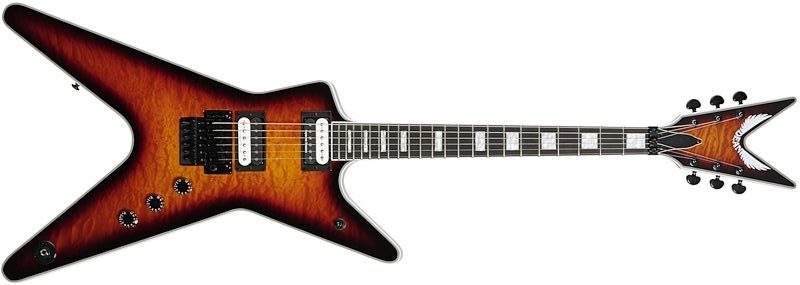
Typically, the build of these guitars tends to be ill suited for the blues. These guitars are often designed for playing very quickly. As such the necks are often slim, the strings are very close together, and the action of the strings is very low. All of these factors make sweep picking and playing fast runs up and down the fretboard much easier. But they aren’t so suitable for slower and more expressive blues playing, which tends to be focused around string bending.
Lastly and most importantly, these guitars tend to be too powerful to be appropriate for the blues. When you are looking for a blues guitar, you actually want a guitar that has quite weak pickups. There are two reasons for this:
Firstly, all of the early blues guitarists played guitars with weak pickups. And so if you are trying to recreate their tones, then it makes sense to use similar gear.
Secondly, weak pickups allow you to play in a more subtle and nuanced way. You can alter your dynamics, touch and feel to produce quite different tones. This is crucial if you want to play in an expressive and emotive style. And it is much more difficult to do when you play a guitar with powerful pickups.
If you are new to the world of guitar pickups, then I cover them in much more detail here. I run through the different types of pickups out there, as well as which pickups you want to avoid if you are looking for beautiful blues tones.
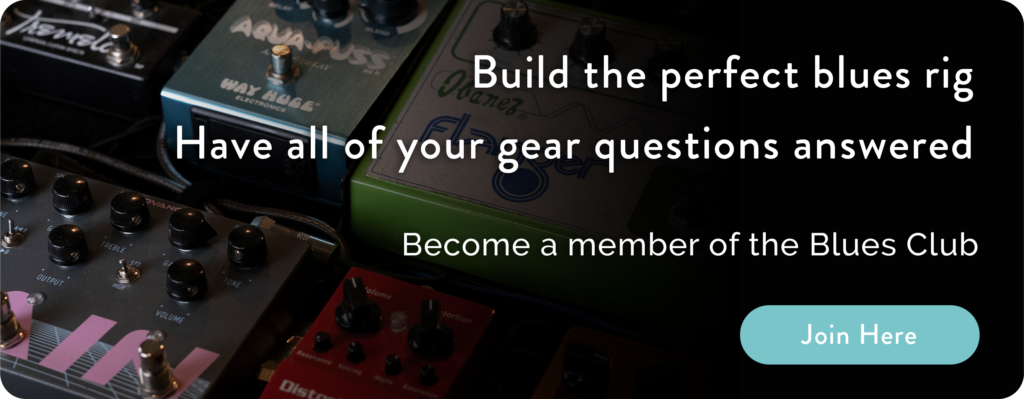
Closing thoughts
By this point, I hope that I have helped to highlight some of the key guitars out there that will work well for the blues. However you might still be feeling confused about which specific guitar to choose.
So to help you zone in on the guitar that will work best for you, I would recommend keeping these final two points in mind:
Firstly, focus on your favourite players and the guitars that they play. If for example you find that all of your blues guitar heroes play Strats, then you can immediately steer your search in that direction. The same goes for Teles and Les Pauls etc.
Now unfortunately it isn’t always so straight forward. Firslty, you are likely to have a variety of influences. You might also find that each of your favourite guitarists plays a different type of guitar.
If that is the case, I would recommend firstly thinking about whether there is a particular type of tone you most want to emulate. After that, I would recommend thinking about whether you are looking to create tones that require you to buy a certain type of guitar.
For example, it would be very difficult to replicate Albert Collins’ stinging blues tones without using a Fender Telecaster. You need a Tele to create that sharp, ‘ice pick’ tone. Likewise, it is difficult to recreate the warmth of a semi-hollow body guitar, when using a solid body. This might all sound obvious, but it is worth reiterating.
Regardless of what you think will work best on paper though, I would always recommend going to a guitar store and trying these guitars out in person. So much of whether a guitar will work for you comes down to feel and playability. In theory, all of the blues guitars that I have recommended here will work for you. But if you find one of them difficult or uncomfortable to play, then it’s not going to be suitable for you.
If you feel comfortable playing your guitar, you will be playing at your best. And this will help you to produce a better tone. You will also be more inclined to practice, which again will have a positive impact on your tone. Most importantly, a guitar that you feel comfortable playing will also be one that you enjoy playing. And that is what this is all about.
So with that in mind, get out there and get trying some of these different blues guitars!
I hope the information outlined here helps you to find the perfect guitar for your set-up. But if you do have any questions at all I can help with, please do let me know. You can either pop them in the comments below or send them over to aidan@happybluesman.com. I’d love to help!
References & Images
Gibson, Equipboard, Gibson Forum, The Analogues, Wikipedia, Music Radar, Sound Fly, Epiphone, Unsplash
Links
Many of the links embedded in this article are affiliate links. As such, if you buy one of the pieces of gear I recommend, or an item from the same store after clicking one of these links, I will earn a small commission. I never recommend pieces of gear that I wouldn’t use myself, and I include these affiliate links to ensure that I can keep this content free. If you have any questions, please feel free to reach out to me on aidan@happybluesman.com.

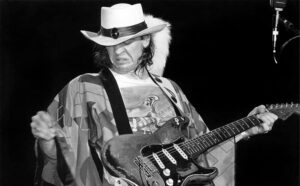
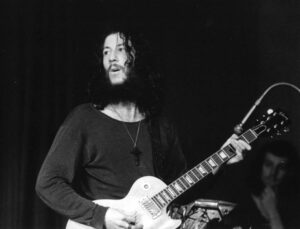


Responses
Man great article, but I must say that I disagree with you on the Telecaster not being suitable for Blues. I say it depends. There are Telecasters with thin sounding pickups, especially some 1960s and those based on 60s Telecasters, but many Telecasters from the 1950s and those based on the 50s models had/have thick and Bluesy sounding pickups that makes them extremely Bluesy. Think of Muddy Waters, Albert Collins even B.B. King used a Telecaster in the 1950s. They got nice thick and juicy Blues tones out of them. Then you have the Blues Rock guys who used Telecasters. Players like Jeff Beck and Jimmy Page with the Yardbirds and Page on the first Led Zeppelin album, those are some thick and juicy Blues tones on that album. I know this is all subjective and based on opinions but give Telecasters a chance. I own a Fender Telecaster and it is a great sounding Blues guitar. The pickups on it produce thick and juicy Blues tones that are closer to a Les Paul guitar than a country type Telecaster with thin sounding pickups. In my opinion like I already said, a lot depends on the pickups and the player. I own both a Gibson Les Paul and a Fender Telecaster and they are both close in tone. The Les Paul has slightly more midrange, but the Telecaster is nice and Bluesy with a thick and juicy tone. I find my Telecaster to have far more midrange than my nephew’s Fender Stratocaster which is also a very nice sounding guitar. The tone of my Tele is close to Dan’s from That Pedal Show Fender Telecaster. Dan’s Telecaster has nice Bluesy, thick and juicy tones. Interestingly his telecaster is a reissue of a 63 Tele, which destroys my original point. But I when one looks at the specs of Telecaster pickups from the 50s and 60s, the 60s Tele pickups tended sound brighter. Not always but most of the time.
Hi Jay, thanks so much for the comment and the kind words. It sounds like you have a lot more experience with Teles than I do! I don’t think I would totally write them off for the blues. They definitely have a place and as you mentioned, there are a lot of great bluesmen who use them. It’s just that if someone were to ask me which of the 3 (Strat, Les Paul and Tele) I would recommend for the blues, the Tele would always come in 3rd place. It’s not that they can’t sound big (Muddy Waters definitely had a big sound!) it’s just that I think they’re lacking those warm tones you can get from a Les Paul or Strat. You can see this even with the examples you’ve given. Albert Collins is famous for his sharp, biting tone and Jimmy Page’s tone is also pretty strident, especially in the Yardbirds. Roy Buchanan, the other famous bluesman who opted for a Tele also has a very sharp and biting sound. That’s not to say it doesn’t work – but to my ear it just lacks that really warm, creamy sound you can get from a Strat or a Les Paul. That’s the sound that I love and why I’d probably opt first for a Strat or a Les Paul. But maybe I’ve just played the wrong teles! 😅
Hi.
I´m very impressed with your articles.
How would you consider the Ultra Stratocaster / Tele for blues with my Fender Blues Junior IV? I had an Elite stratocaster, but unfortunately I sold it. I regret that very mutch. And now I must purchase a new bluesguitar.
Best regards Rune J.
Thanks so much for the kind words Rune, I really appreciate it 😁 As for the Ultra Strat or Tele – I think either would sound brilliant with your Blues Junior IV. I used to have a Fender Hot Rod Deluxe (which is quite similar to the Blues Junior IV but bigger and higher wattage) and my Strat sounded amazing paired up with it. The cleans are great, and those types of amps take pedals really well. So if you want a solid base tone that you can then adjust for a range of different vintage style overdrive sounds, that amp will set you up nicely, regardless of whether you go for the Strat or the Tele.
As for the differences between the 2 guitars – each is brilliant in their own way. I would say that it all depends on the core tone and sound you are looking for. The Strat has a very specific sound. And depending on what type of tone you are looking for, you will struggle to get that sound without going for a Strat. I have always loved Stevie Ray Vaughan’s tone and in fact many of the guitarists that had a heavy influence on me when I started playing the guitar (Jimi Hendrix, Rory Gallagher, Eric Clapton, Robert Cray, Eric Johnson etc) were Strat players. So it wasn’t until I bought my Strat a few years ago that I was able to get closer to creating the tone I had in my head. I think the Strat is an amazing guitar and I think it is one of the best guitars you can go for if you are looking for a range of beautiful vintage blues tones.
Funnily enough, I actually owned an American made, vintage style Telecaster before I bought my Strat. In a similar story to you, I sold it and now I regret that quite a lot! The reason I got rid of it was because personally I found that it had too much bite and the sound was too sharp. I think for this reason historically it has probably been less popular with blues guitarists – but there are still some very notable Tele players – like Albert Collins, Roy Buchanan and Robben Ford. More recently, guitarists like Josh Smith have also produced some beautiful tones using Teles.
On balance (and this is just my opinion!) I would probably say that the Tele is a more rounded guitar. I think you could use that in a greater range of musical contexts to play styles like jazz, country and rock. But if you are looking for a guitar to predominantly use to play the blues or blues rock, then the Fender Strat would be my top choice.
I hope that helps – but if you do have any more questions I can help with, just send me an email on aidan@happybluesman.com and I’d love to help!
Very nice article. I thought I might drop this comment because its pretty different. I ‘m very happy with my ESP 256LTD. It has a Les Paul style body and is really nice. ESP are more know for being Metal Guitars , I get good blues tones out of mine it does have humbuckers. It’s a pretty versatile guitar. Someone can play Master of Puppets or slow blues to a backing track . That’s a pretty wide range of tone and music .
Thanks very much for the kind words and the comment Earl. That is a great point and one that is important to keep in mind – how you feel when you play your guitar and how much you enjoy playing it makes a big difference. After all, you can have the best ‘blues guitar’ in the world, but that means very little if you don’t like playing it.
As you noted, ESP guitars are better known for metal than they are the blues, but if you are happy with your guitar and can use it dial in some more mellow blues tones, then that’s brilliant! 😁
Quite fortunate to live in the UK I own two Vintage JHS Guitars, one is a Stratocaster Style with 3 Stacked P90’s and my main player is V100 Tobacco Burst with 2 Wilkinson Double Stacked Alnico 5 Humbucker’s these are the ones that Trevor Wilkinson legend in the Guitar builders world who worked at Fender in California with Leo and knew Les Paul and Seth Lover and worked with Seth Lover on making a PAF for his brand Wilkinson , it’s not a Les Paul it will never will be but my tech after he set the guitar up said I understand why Gibson is pissed, my point is you don’t have to spend thousands for a great guitar for me it does not make sense to spend thousands on a guitar being a home player that just enjoys learning and playing the blues, my V100 gets those blues tones I highly recommend them,
Hi Brian, thank you so much for the comment and for sharing your experiences. I’m very glad to hear you’re getting on well with your Vintage guitars. As you’ve noted, they make some great Les Paul and Gibson style guitars – the build quality is high and they are also very well priced too.
In my opinion, the most important thing is that you enjoy playing whichever guitar you choose. You can have the best guitar in the world ‘on paper’, but if it doesn’t feel right to you and you don’t enjoy playing it, then you’ll be less inclined to play, and your tone will also suffer as a result. I don’t think it really matters whether that guitar is £400 or £4000 – if the person playing it is happy and they feel the guitar is good value, then that is the most important thing.
But you are absolutely right, with the very high build quality across the board nowadays – you certainly don’t need to spend thousands to find a guitar that plays well and produces killer tones too!